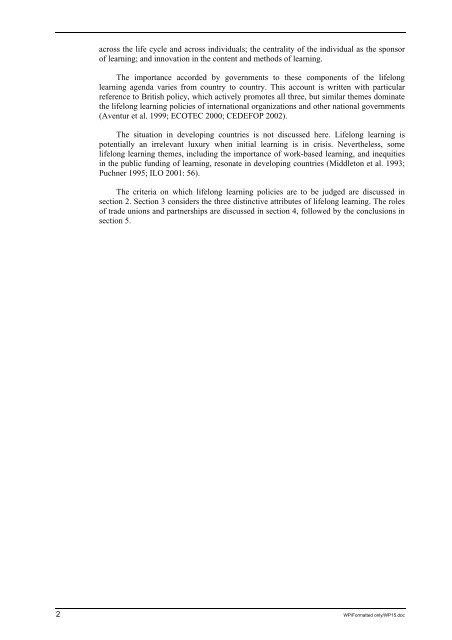Lifelong learning - International Labour Organization
Lifelong learning - International Labour Organization
Lifelong learning - International Labour Organization
You also want an ePaper? Increase the reach of your titles
YUMPU automatically turns print PDFs into web optimized ePapers that Google loves.
across the life cycle and across individuals; the centrality of the individual as the sponsor<br />
of <strong>learning</strong>; and innovation in the content and methods of <strong>learning</strong>.<br />
The importance accorded by governments to these components of the lifelong<br />
<strong>learning</strong> agenda varies from country to country. This account is written with particular<br />
reference to British policy, which actively promotes all three, but similar themes dominate<br />
the lifelong <strong>learning</strong> policies of international organizations and other national governments<br />
(Aventur et al. 1999; ECOTEC 2000; CEDEFOP 2002).<br />
The situation in developing countries is not discussed here. <strong>Lifelong</strong> <strong>learning</strong> is<br />
potentially an irrelevant luxury when initial <strong>learning</strong> is in crisis. Nevertheless, some<br />
lifelong <strong>learning</strong> themes, including the importance of work-based <strong>learning</strong>, and inequities<br />
in the public funding of <strong>learning</strong>, resonate in developing countries (Middleton et al. 1993;<br />
Puchner 1995; ILO 2001: 56).<br />
The criteria on which lifelong <strong>learning</strong> policies are to be judged are discussed in<br />
section 2. Section 3 considers the three distinctive attributes of lifelong <strong>learning</strong>. The roles<br />
of trade unions and partnerships are discussed in section 4, followed by the conclusions in<br />
section 5.<br />
2 WP/Formatted only/WP15.doc

















